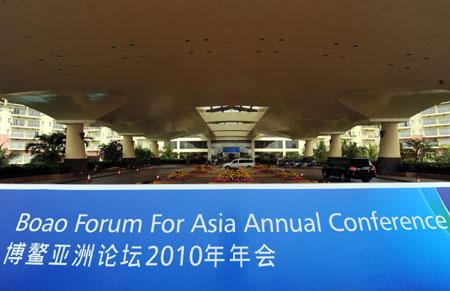BOAO, Hainan - Fidel Ramos, former Filipino president and now head of Boao Forum for Asia (BFA), has called on Asian nations to embark on sustainable and "green" recovery in post-crisis adaptation.
The entrance of the hotel to host the Boao Forum for Asia attendees is seen in this photo taken on April 8, 2010. the forum will kick off on Friday.

The entrance of the hotel to host the Boao Forum for Asia attendees is seen in
this photo taken on April 8, 2010. the forum will kick off on Friday. [Photo/Xinhua]
"Each country must study how government-led investment can work to fuse both 'green' and 'growth' in a sustainable way over the longer term," Ramos wrote in the official publication for the BFA's annual meeting which will officially open on Saturday.
Although Asia's recovery has been a major bright spot in the world over the past year, Asian nations need to consider how to chart a path for future sustainable development, he said.
"Much of the world has changed in the past years, but not our sources of energy," he said, noting that oil, natural gas and coal create 85 percent of the world's energy -- making fossil fuels necessary to economic growth for the foreseeable future.
"It is for this reason that every country must redouble their earlier commitments to develop viable energy alternatives, especially in renewables, to reduce our fossil fuel consumption," he said, adding "this global imperative needs to be embedded into the core of every national and regional recovery policy."
The BFA, a pan-Asian platform of dialogue for key issues affecting Asia and the world, will convene its annual session on April 9-11 in Boao, a scenic town in south China's island province of Hainan.
With the theme of "Green Recovery: Asia's Realistic Choice for Sustainable Growth," this year's session focuses on practical solutions that improves livability and use "green growth" to improve livelihood opportunities and enhance people's living standards.
Ramos said multiple technologies, instead of "just one or two technological developments," are needed to address energy use in complex systems including housing, urban development, transportation and agriculture.
He also called on nations to achieve closer cooperation to "prevent the exacerbation of global warming."
An annual report on the integration of Asian economies, prepared for the BFA meeting, said the Asia-Pacific region had become the world's largest emission source of carbon dioxide, with its emission amount accounting for half of the world's total.
But its per capita emission is only about a quarter of the world's average, the report said.





